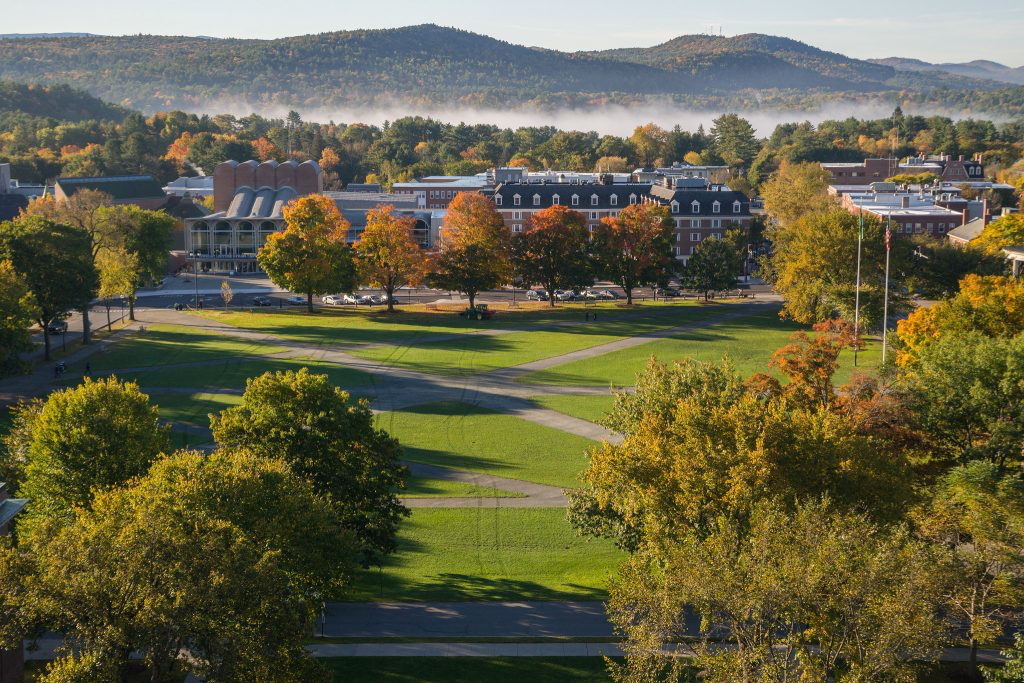
Hanover, NH, 29th US municipality to commit to replacing fossil fueled energy with renewable energy. Image: Dartmouth Flickr
By Rick Wackernagel
On May 9, 2017, the townspeople of Hanover, New Hampshire voted to make their town the 29th municipality in the United States to commit to getting all its energy from renewable sources. It was the first U.S. municipality in which residents approved this goal by popular vote. That vote was unanimous.
Hanover plans to be 100% renewable in electricity by 2030, and in heating and transportation by 2050. Among other cities and towns adopting 100%-renewable goals are San Diego, Atlanta and Moab, Utah. Burlington, Vermont, also on the list, is the first city in the U.S. to derive all its electricity from renewable sources.
This renewable Hanover tale begins about two years ago. Judi Colla, of the Sierra Club Upper Valley Group, saw an opportunity in a request for proposals from the Sierra Club national organization and applied for a grant to bring the Sierra Club’s “Ready for 100” program to the Upper Connecticut River Valley region of Vermont and New Hampshire. Communities participating in the program commit to working individually and collaboratively to transition away from fossil-fuel energy to clean, renewable energy. The Sierra Club provides its expertise in helping communities organize to deal with environmental problems, and access to its national research and grant-making resources. After the application was approved, the Upper Valley Group brought Ready for 100 to the Sustainable Hanover Committee, and the two groups decided to collaborate. They began by working to expand public support for renewable energy.
Preparing for the town meeting took time and a team. The Sustainable Hanover Committee had a track record of running successful programs and extensive connections within the community. Hanover’s town manager, Julia Griffin, and heads of departments such as Public Works and Zoning and Planning joined the effort whole-heartedly. The Sierra Club Upper Valley Group and Sierra Club community organizer Ally Samuell continued their efforts – learning about transitioning to renewable energy and sharing their knowledge at meetings. In the summer of 2016, representatives of Hanover’s town government attended the first North American 100% Renewable Cities Dialogue. At that gathering, Hanover’s representatives started connecting with Sierra Club resources and with participants from cities and towns across North America. The collective results of everybody’s research and planning found a receptive audience. Hanover is a relatively well-educated community, with many of its residents looking for ways to do something about climate change and eager to serve as a model. The roughly 400 residents attending the town meeting voted unanimously to adopt the 100%-renewable goal.
A good goal is a catalyst for new activity. Hanover’s case, however, shows the interplay between activity and goals. Hanover has a legacy of environmental stewardship. About six years ago, its town government started budgeting $50,000 per year for energy efficiency and other sustainability improvements to town facilities. These efforts reduced Hanover’s municipal energy spending by 31%. In 2014, the Sustainable Hanover Committee successfully campaigned for the town to become a Green Power Community, as well. These experiences made the new goal look attainable. The vote was a formal stamp of approval for work already contemplated. The head of the Department of Public Works responded to the affirmative vote saying, “Now we can start doing all the things we’ve been talking about.”
New activity started quickly. After the town meeting, town manager Griffin established a transition team for municipal operations, focused on finding renewable sources of energy and further reducing energy use. Since the meeting, Hanover has started revising its building codes to require new construction to include renewable energy. The Select Board has authorized the town manager to budget funds for converting town buildings to 100%-renewable electricity. Heat pumps are being installed to replace fossil-fueled heating systems. Solar panels will be installed on municipal roofs. The Town’s Ready for 100 team and the Sustainable Hanover Committee are identifying other measures that can be taken right away.
Forward planning is allowing the town of Hanover to limit the financial impacts of converting to renewable energy. Initial funding for efficiency upgrades and energy investments is coming from capital reserves, minimizing impact on property-tax rates. Savings in energy costs in the future will reduce the impacts of future investments in facilities and equipment. These plans assume no special state or federal funding for the conversion.

Hanover, NH ranked in the top 30 college towns of America. Dartmouth College is an integral part of the Hanover community and is also committed to the 100% renewable goal. Photo by Eli Burakian ’00 – Dartmouth Direct, July 20, 2016.
Some sections of the path ahead are less clear than those just described. Transitioning low-income households to renewable energy is one of these sections. Energy efficiency and renewable energy save money in the long run. However, they often have high upfront costs. Hanover’s Affordable Housing Commission will be looking for ways to make the transition more affordable for these households. Financing sustainability investments through property-tax, electric-meter or gas-meter assessments is a possibility. The Twin Pines Housing Trust has tapped funds from the Federal Rural Utilities Service for weatherization and energy improvements. Vital Communities, a local nonprofit organization, seeks and develops programs for making sustainability easier and cheaper to achieve. While the town recognizes the need to replace fossil fuels used in transportation, action is limited by lack of commercially available technology for vehicles with high power requirements, such as snow plows, dump trucks, fire trucks and ambulances.
 Dartmouth College has a big footprint in Hanover. It is also committed to renewable energy and has implemented a variety of measures. It began investing in improving energy efficiency in its buildings a few years ago and has reduced electricity consumption by 30%. This past Earth Day, Dartmouth president Phil Hanlon announced the results of a task force developing recommendations for moving the campus toward sustainability. Dartmouth will replace its steam heating system, fed with No. 6 fuel oil, with a hot-water system using renewable energy. Dartmouth’s forests in the White Mountains are a possible source of sustainable biomass for the energy. Solar panels will be installed on rooftops of Dartmouth buildings, starting with the alumni gymnasium and a classroom building this summer. Dartmouth is also partnering with the town of Hanover in developing a 10-MW solar farm on land that they own jointly.
Dartmouth College has a big footprint in Hanover. It is also committed to renewable energy and has implemented a variety of measures. It began investing in improving energy efficiency in its buildings a few years ago and has reduced electricity consumption by 30%. This past Earth Day, Dartmouth president Phil Hanlon announced the results of a task force developing recommendations for moving the campus toward sustainability. Dartmouth will replace its steam heating system, fed with No. 6 fuel oil, with a hot-water system using renewable energy. Dartmouth’s forests in the White Mountains are a possible source of sustainable biomass for the energy. Solar panels will be installed on rooftops of Dartmouth buildings, starting with the alumni gymnasium and a classroom building this summer. Dartmouth is also partnering with the town of Hanover in developing a 10-MW solar farm on land that they own jointly.
Yolanda Baumgartner, co-chair of the Sustainable Hanover Committee, says, “When the vote was called at town meeting, the ‘Ayes’ that came back were enthusiastic and unanimous. One could say it was an electrifying moment!“ Town manager Julia Griffin says, “This project is a perfect example of how one small group of citizens can make a difference in the community.” Other towns in the Upper Valley are watching. A couple of people from Lebanon, New Hampshire may tag along with Hanover’s Ready for 100 team at the 2nd Annual North American 100% Renewable Cities Dialogue this July. The work done in Hanover is a model for towns in the region to follow. Ally Samuell and the Sierra Club Upper Valley Group are ready to help.
Green Energy Times extends congratulations and thanks to the citizens and Town of Hanover for this outstanding decision! It is an example for all of us working to make a carbon-free energy system a reality. We support your decision and efforts whole heartedly!
Rick Wackernagel is a member of the Energy and Climate Committee, Sierra Club Vermont Chapter
Many thanks to our sponsors:
























